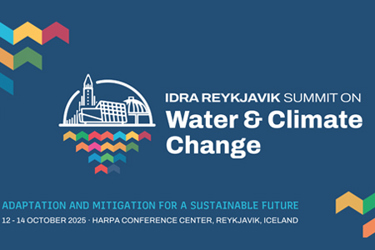IDRA Reykjavik Summit Advances Global Dialogue On Water And Climate Resilience

Leaders emphasize that integration, investment, and scaled implementation are key to global water security.
Reykjavik, Iceland – The International Desalination and Reuse Association (IDRA) Summit on Water and Climate Change 2025 concluded yesterday in Reykjavik, highlighting the urgent need to integrate water reuse and desalination into global climate resilience strategies.
The two-day Summit brought together over 400 participants from 38 countries, fostering discussions on the water-energy-food nexus, climate adaptation, circular water economies, and digital transformation in water management.
Integration, Investment, and Implementation: The Path Forward
Shannon McCarthy, Secretary General of IDRA, emphasized the importance of actionable collaboration.
“The IDRA Reykjavik Summit made clear that resilience cannot be achieved through isolated efforts, but through genuine integration. When finance, technology, and policy come together, transformative progress becomes possible. Integration is a necessity for global clean water security and the blueprint for mitigating and adapting to a changing climate,” McCarthy said.
Jon Freedman, IDRA President, noted the Summit as a key milestone.
“The technology exists, the financing tools exist. What is needed now is structure and scale. The IDRA community is taking action by uniting policy, finance, and innovation into a cohesive framework that advances water security and global resilience,” Freedman said.
Technical and Thematic Programs
The thematic program explored climate resilience, integrated resource management, water equity, circular economy approaches, and digital transformation, with sessions on collective action and governance models. The technical program featured presentations on advanced desalination and reuse technologies, AI-driven monitoring, and practical case studies demonstrating scalable water solutions.
Key discussions focused on how innovative regulations, stewardship principles, and coordinated investment can deliver measurable water security outcomes, while linking water strategies to broader climate and economic planning.
Panels also examined strategies for mobilizing investment in circular water economies, highlighting the role of financial tools, regulatory frameworks, and coordinated action in scaling sustainable water solutions.
Looking Ahead: From Reykjavik to Kuwait and Riyadh
Following Reykjavik, IDRA in partnership with the Arab Fund, will convene a high-level roundtable on water finance and scarcity solutions in Kuwait in 2026, and the IDRA World Congress 2026 in Riyadh, Saudi Arabia, hosted by Saudi Water Authority under the patronage of the Ministry of Environment, Water, and Agriculture, where the next phase of global water resilience initiatives will be advanced. The Call for Extended Abstracts for the World Congress 2026 opens 15 November 2025.
The International Desalination and Reuse Association (IDRA) is a U.S.-based (Delaware) non-profit 501(c)(6) organization and a recognized NGO with consultative status under the United Nations Economic and Social Council (UN ECOSOC). As a proud partner of the Food and Agriculture Organization of the United Nations (FAO) and its WASAG Global Framework on Water Scarcity in Agriculture Initiative, IDRA also holds official status with the United Nations Framework Convention on Climate Change (UNFCCC).
With a diverse network spanning over 60 countries, IDRA connects public and private sector professionals, scientists, researchers, and students. As a global hub for the desalination and water reuse industries, we foster collaboration, innovation, and knowledge-sharing to drive sustainable water solutions and ensure a water-secure future for all.
Source: International Desalination and Reuse Association (IDRA)
